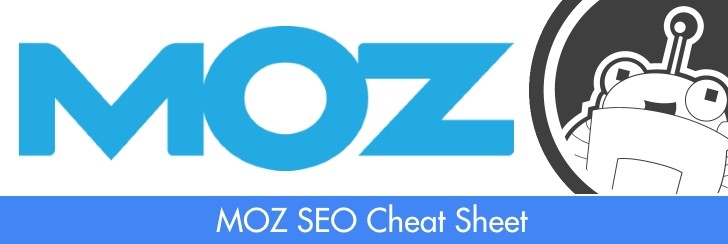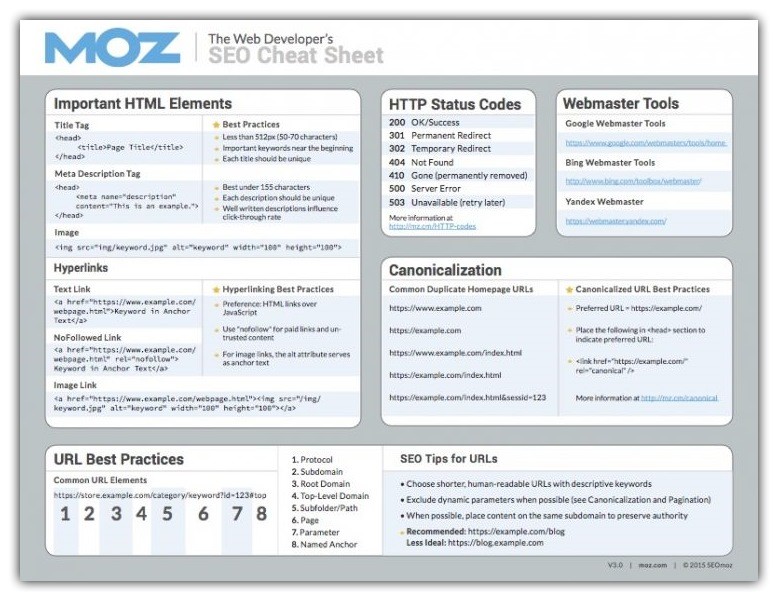
Search Engine Optimization isn’t rocket science, but the practice itself is dynamic and will change from time to time. That’s why true SEO professionals must always stay up-to-date on search engine best practices. At the end of the day, if the SEO strategy you’re implementing isn’t up to date then all the time and effort put into such a campaign will be a waste.
Researching and figuring out SEO best practices can be time consuming and resource intensive, which is why most web developers and SEO practitioners don’t actually do this themselves. Rather, they rely on trusted research brands like MOZ to conduct these studies, and once all the results are in it’s just a matter of implementing the recommended guidelines.
Moz releases an updated “SEO cheat sheet” every once in awhile to keep everyone up-to-date on the evolving world of search engine optimization. The latest is version 3.0, which Moz claims is their perspective of SEO practices for 2015. Within the 4 pages, Moz covers many major aspects of what need to be done to optimize a website for search engines such as Google.
The first section covers topics such as important HTML elements, canonicalization, URL best practices, and where to go to access various search engine webmaster tools.
According to Moz, the Title tag should be less than 512px and consists of 50-70 characters, with important keywords in the beginning. Meta Description tags should be under 155 characters, and each description should be unique.
Most importantly, in this section Moz recommends that SEO practitioners use HTML links over JavaScript. This is likely due to the fact that JavaScript has built up a rather negative image for itself over the past several years due to frequent security holes and exploitable parameters used by hackers and the likes.
In the second section Moz recommends not blocking CSS or JavaScript with robots.txt. Robots.txt continues to be a mandatory requirement in modern day SEO practices, so where it’s placed and how it’s formatted is crucial.
Proper sitemap syntax and pagination help spiders crawl sites much more efficiently, but more importantly they allow users to navigate throughout the sites with ease—isn’t that the point of making a great website or portal?
The third section covers social media and how to generate rich snippets. It’s a given that people need to integrate social media into their websites, but Moz recommends Open Graph data within the tags. Popular social platforms such as Facebook, Twitter, Google+, LinkedIn and Pinterest support the Open Graph Protocol.
The last section dives into targeting multiple languages and the almighty responsive design. First off, sites must declare which languages they’re using, and it helps to also possess the ccTLDs of the countries speaking those languages. Popular languages include Chinese, Spanish, English, Arabic and Hindi. Investing in developing a multi-language site will require resources, but it’ll make sites more credible—especially in an SEO sense.
When it’s all said and done, SEO practitioners need to make their sites responsive—that is, they need to make their site compatible with mobile browsers. Responsive design has been around for quite some time, but it was only recently that Google made the announcement that it will penalize sites that aren’t optimized for mobility. A third of the world now browse the web on their mobile devices, which means SEO has to adapt. Sites that aren’t optimized using responsive design or other means are basically neglecting a third of the world’s traffic.
SEO is a lot like painting a fence. After the paint weathers a few storms, people will have to do some touching up to make sure what they built will stand for a few more years—then rinse and repeat. The Moz SEO best practices cheat sheet is a great starting point for beginners, but even veterans can use some of the tips. Not to mention, it’s free!
—
Tim Dugan, Web Services CT






